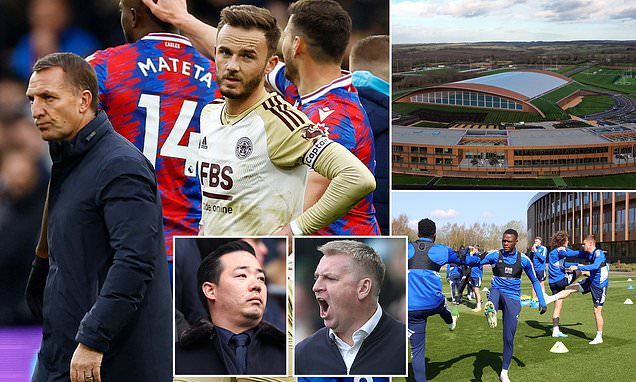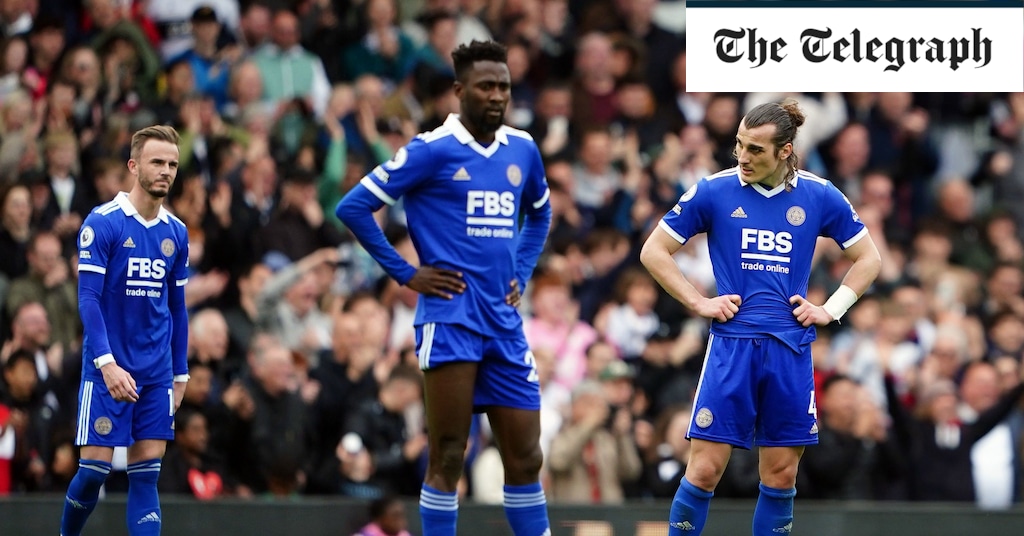There is no starker example of the razor’s edge many Premier League clubs outside the elite walk than Leicester City: Once the League's most improbable champions, two fifth-place finishes - one as recently as 2021 and FA Cup winners the same year - and now fighting for their lives against relegation.
A very private club,
previously run by a patriarch who made all the big decisions with the kind of instinct and ruthlessness with which he had built his business empire in Thailand. When
Vichai Srivaddhanaprabha died in 2018 in shocking circumstances a void was naturally left. It was to be the end of an era, although that took a while to unfold.
He left behind him firm foundations - and a plan of sorts, but it is hard to replicate the man himself. Since that astonishing season of 2015-2016, Leicester have been obliged to play a difficult game of sale and renewal.
They have made some of the most lucrative trades of modern times - N’Golo Kante, Riyad Mahrez, Danny Drinkwater, Ben Chilwell, Harry Maguire, Wesley Fofana - and still have some saleable talents now. But it is a hard existence to continue that way ad infinitum. Even for a billionaire family.
The blame is now being directed by fans at
former manager Brendan Rodgers and director of football, Jon Rudkin. Defeat by Liverpool on Monday will see them approach the last two games of the season in the bottom three. Relegation would not be the end of the story but it would cap an astonishing tale of rise and fall.
For years they were rightly held up as the model club, and they may yet be the most jarring example, even more so than Southampton, of how a few misjudgements can send the whole ship spinning out of control.
The seven players out of contract this summer, including captain Youri Tielemans, naturally suggests a squad not pulling in the same direction. An ambitious transfer window in 2021, and no major sales, fell flat and led to a troubling absence of activity last summer before an attempt at catch-up in January. The golden touch in the market has eluded Leicester. The price for that has been steep.
No-one from the Leicester hierarchy talks publicly. The club is run by two executives who have access to the ultimate decision maker, Vichai’s son Top and the new king of owners King Power. Susan Whelan runs the commercial side of the club as chief executive but does not touch football decisions.
Rudkin reports directly to Top, as he did Vichai, and is his boss’ chief advisory voice on all matters from signings to managerial sackings and appointments.
Rudkin was handpicked by Vichai for what has been a dizzying rise. The late owner was very much the kind of employer who sought out people he liked and rated, and he would trust them.
It is fair to point out that Rudkin was there in the glory years under Vichai. Rudkin’s status grew to the extent that he is also the ultimate boss for the Srivaddhanaprabha family on their other major British sporting operation: King Power Racing (KPR).
It would also be right to say at this point that the club play down Rudkin’s role in KPR. They say that he is more of a conduit between the bloodstock manager Alastair Donald, various trainers and the ownership, previously Vichai and now Top.
Others see it differently and that Rudkin is understood to play a key part in the decisions on acquisitions of horses and with which trainers they are placed. KPR has around 100 horses with different trainers, and has been one of the top ten racing operations in Britain at times, perhaps even bigger.
Indeed one week after the Premier League season concludes next month KPR might well have a runner in the Derby, the highly-rated rated The Foxes. Depending on how the last three games of the season progress, it might be cold comfort for devotees of the other Foxes.
Either way the big decisions that were once made by Vichai - sacking Nigel Pearson,
appointing Claudio Ranieri, sacking
Ranieri as late-2016 Leicester threatened to plummet - are less a feature of the club. Rodgers clearly went on too long. The club should have got rid of Tielemans long ago. By last summer there were no takers for the Belgian.
The staleness in the squad has been obvious to those who have watched closely. The Athletic’s reporter Rob Tanner, who has covered the club for years, made some reasonable suggestions in March in a piece warning about relegation which were dismissed by midfielder James Maddison on Twitter as “rubbish”. The hubris of that response now scarcely needs pointing out.
Maddison and Tielemans have been captains in a crucial season at the end of which it has been clear for some time that both will be leaving. It is the kind of muddled-thinking that would have been dealt with when Leicester were a more sure-footed club.
The Srivaddhanaprabha family have stoically accepted some huge losses - £92.5 million in March for the previous financial year. Covid hit the King Power duty free empire hard, and the club have borrowed money against the future payments on the Fofana sale.
Even so, the family’s legacy is not in doubt. The man who made it all possible is gone and those he left to run the show are discovering that football - and the Premier League in particular - is the kind of place where you have to make decisions fast. Vichai shocked the game with some of his sackings and yet he was right. The calls that no-one sees coming are often like that.
Leicester were always obliged to box clever, even with a billionaire in charge. They sold high and bought low and when they conquered English football in 2016 it was thrilling to watch. Looking back, that season still feels like a miracle. It is what follows, and the expectation that come with it, that is so hard to meet year after year.
www.thehornetsshop.co.uk
www.thehornetsshop.co.uk
www.thehornetsshop.co.uk


